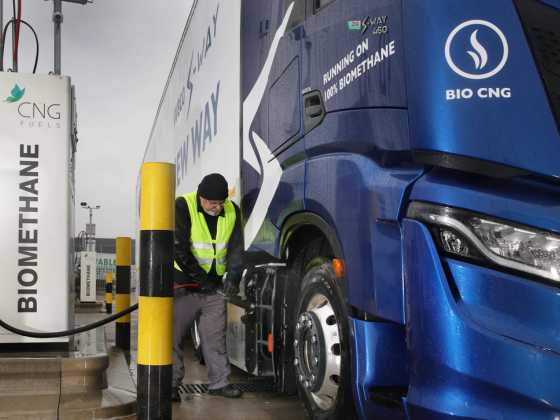From waste to energy
The retention of the duty differential for bio-diesel from used cooking oil until March 2012 is excellent news for the transport industry, says the UK Sustainable Bio-diesel Alliance
 The government’s Pre Budget Report (PBR) announcement to retain the duty differential for bio-diesel from used cooking oil until March 2012 has been warmly welcomed by the UK Sustainable Bio-diesel Alliance (UKSBA) and represents a significant victory for the campaign.
The government’s Pre Budget Report (PBR) announcement to retain the duty differential for bio-diesel from used cooking oil until March 2012 has been warmly welcomed by the UK Sustainable Bio-diesel Alliance (UKSBA) and represents a significant victory for the campaign.
The 2008 Budget initially announced that the 20p per litre duty differential for all bio-diesel would be removed in April 2010. Reacting in part to the Gallagher Review which raised questions over the sustainability of some forms of bio-fuels, the government claimed that the tax discount could not differentiate between sustainable bio-fuels and those that raised greenhouse gas emissions or raised wider sustainability issues. It therefore proposed to remove the tax differential for all bio-fuels from April 2010, instead relying on the trading of sustainability certificates under the Renewable Transport Fuel Obligation (RTFO).
Support for the industry
Formed as a direct result of the 2008 Budget announcement, the UKSBA brought together UK-based producers, users and supporters of sustainable bio-diesel and set out to campaign for the differential to be retained for sustainable bio-fuels. The UKSBA argued that the RTFO was not a sufficiently robust mechanism to support the industry on its own and that under the proposals many customers would not be able to afford to continue using the sustainable bio-diesel they had pioneered. For example, a captured vehicle fleet using B100 sustainable bio-diesel would experience a 20 per cent increase in its fuel costs – completely untenable in the current economic climate. They would cease to purchase the fuels and producers would rapidly go out of business – an experience reflected in other countries such as the US and Germany, where governments have failed to appropriately support their bio-fuel industries.
The UKSBA argued that producers using fully sustainable fuel sources, such as used cooking oil (UCO), which would otherwise clog up the drainage systems at huge cost to the utility companies, or go to landfill, should be supported and their customers encouraged to continue to use high-blend bio-diesel fuels. In that way, the growing low carbon economy in the UK could be encouraged, providing vital jobs and helping the UK government to meet its challenging carbon reduction targets.
A change of heart
The campaign was highly successful in a very short time frame and in December 2009, the Chancellor announced the intention to retain the differential for bio-diesel from UCO for a further two years.
Responding to the government’s change of heart, Chair of the UKSBA, Mark Sneesby said: “Transport is the only sector of the UK economy where carbon emissions are still rising and sustainable bio-diesel has a significant role to play in helping to reduce this. The retention of the duty differential until March 2012 means that the industry has the chance to build on the three million tonnes of CO² already being saved via sustainable biodiesel and that companies that use high blends of UCO based biodiesel in their captive fleets and on the forecourt can continue to do so.
“This announcement shows that the government is willing to stand behind the UK’s innovative UCO based biodiesel industry and act on rising carbon emissions from transport. The UKSBA’s members and supporters are delighted that the government has listened to industry and chosen to act.
”However, there is more to do. We continue to work with the Department for Transport and others in government as we prepare for the implementation of the Renewable Energy Directive. We want to see UK policy committed to supporting a thriving UK low carbon economy, providing producers and customers with proper support as the industry develops. We need to support the UK sustainable producers, not tick boxes and targets by importing all of our bio-fuels from abroad at greater cost to the planet, increased carbon emissions and little energy security for the UK.” For producers on the ground, such as founding UKSBA member Convert2Green Ltd, the announcement has saved hundreds of jobs.
Case study
Convert2Green is a leading UK waste to energy group based in Middlewich, Cheshire. The company collects and recycles waste vegetable oil from across the food industry to produce a range of high quality bio-fuels for use in commercial vehicle fleets and to drive heat and power systems. They are one of the top five sustainable bio-fuel producers in the UK and produce the bio-diesel used by 3663 First For Food Service to fuel their delivery lorries.
In fact, it was 3663’s strongly held commitment to minimising their impact on the environment that first led them to work with Convert2Green. In a highly virtuous circle, Convert2Green collect the waste cooking oil from 3663 customers and suppliers, process it into to bio-fuel and then return it to 3663 to power their delivery fleet. 3663 are the UK’s largest food distributor currently servicing more than 40,000 catering outlets, including schools and hospitals.
Speaking of their waste oil to energy recycling initiative a spokesperson for 3663 said: “3663 are constantly searching for new ways to reduce the environmental impact of its delivery fleet. This is why such initiatives as the one we have in place with Convert2Green are so important to us. At present approximately 50 per cent of the 3663 delivery fleet now uses a bio-diesel mix, with plans to extend this further into the rest of the fleet. We are also looking at further carbon saving initiatives with Convert2Green, including the use of bio-fuel driven heat and power solutions.”
3663’s commitment to managing and minimising their environmental impact dates back some ten years and has evolved to become embedded across all areas of their business.
High-level recognition
The 3663 partnership with Convert2Green has even gained important political recognition from Liberal Democrat Transport spokesperson, MSP Alison McInnis. On a visit to the 3663 Edinburgh depot, she said: “The work 3663 and Convert2Green are doing to lessen the environmental impact of their fleet is a shining example of best practice. Bio-fuel is not the total answer to climate change, but its use in reducing transport emissions is certainly part of the solution.”
Convert2Green uses bio-fuel in its own production processes, to power its site in Middlewich and in its oil collection and delivery vehicle fleets. This combined with their partners’ use of bio-fuels for fuel and power needs, enables them to deliver up to a 90 per cent reduction in their own and their partners’ lifecycle carbon footprint.
It’s perhaps of no surprise to learn therefore that Convert2Green also work in partnership with other key clients in the food and hospitality industry, including Nando’s, Robinson Family Brewers, and Cygnet Foods, to reduce their carbon emissions and cut costs. Increasingly, they are also beginning to work with major organisations in the public sector, such as H M Prison service to achieve the same goal.
As issues of carbon management and climate change continue their unrelenting climb up the political ladder, this is one particular management concern that threatens to take on a whole new life of its own!
For more information
Contact Deborah Webb on 01606 833330 or visit the Convert2Green website at www.convert2green.co.uk






